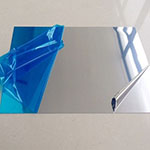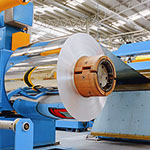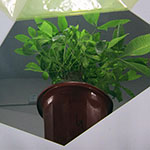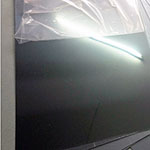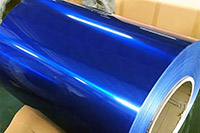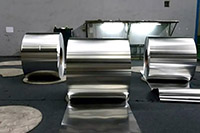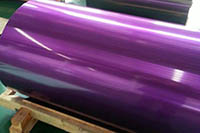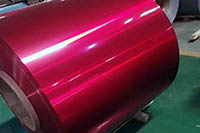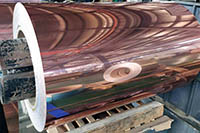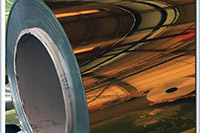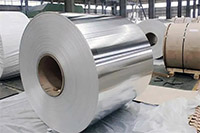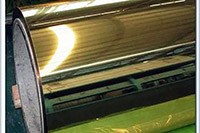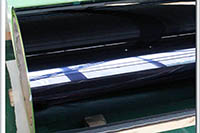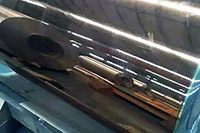What is a Mirror Aluminum Sheet?
Mirror aluminum sheet coil is an aluminum product processed through rolling, polishing, and other techniques to achieve a mirror-like surface effect. Its surface is specially treated to provide extremely high light reflectivity and smoothness, and it is usually delivered in sheet form (mirror aluminum sheet) or coil form (mirror aluminum coil).
The reflectivity of mirror aluminum sheet is 86%-95%. Compared with anodized mirror aluminum sheet, its surface is brighter and more attractive, but also more prone to scratches.
Mirror aluminum sheets/coils are high-reflectivity materials that can be manufactured through rolling, polishing, anodizing, or coating processes. They combine durability and aesthetics, making them suitable for a wide range of applications from building facades to solar energy systems. The main alloys include the 1000, 3000, and 5000 series, with thicknesses as low as 0.08 mm, suitable for ultra-thin designs.
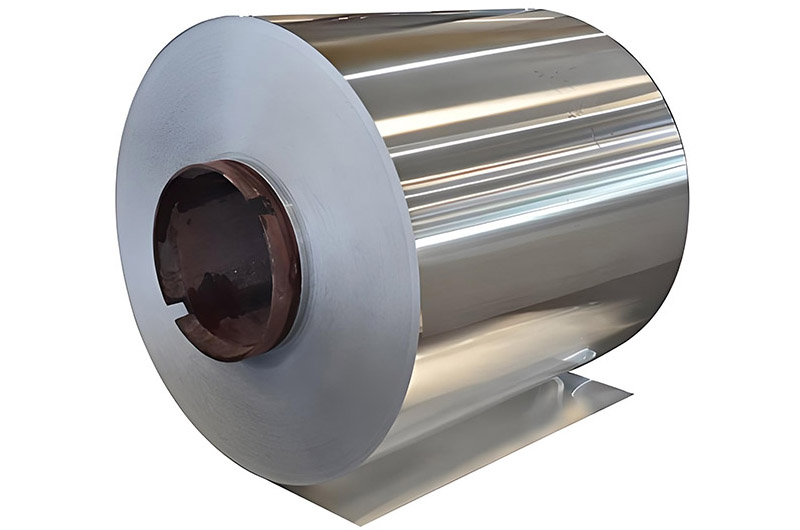
Mirror Aluminum Sheet Coil Reflectivity
The most remarkable feature of mirror aluminum sheet coils is their high reflectivity, which is also the main criterion for distinguishing different grades of mirror aluminum.
The most remarkable feature of mirror aluminum sheet coils is their high reflectivity, which is also the main criterion for distinguishing different grades of mirror aluminum. Depending on the product quality and processing, the reflectivity of mirror aluminum sheets can be classified into the following levels:
- Ordinary Mirror: Reflectivity about 80%-86%.
- Standard Mirror: Reflectivity about 86%-90%.
- High Mirror: Reflectivity about 90%-93%.
- Super Mirror: Reflectivity above 95%.
It is worth noting that reflectivity is usually divided into three indicators: total reflectance, diffuse reflectance, and specular reflectance. High-quality mirror aluminum sheets have high total reflectance and low diffuse reflectance.
Specifications of Mirror Aluminum Sheet Coil
Mirror aluminum coils can be customized according to specific customer requirements, including single-sided or double-sided coating, and leveling to specific lengths. During production, the surface of the aluminum coil is treated to be smooth and scratch-free, with burr-free edges.
Reflectivity and Material
- Reflectivity: 80%, 86%, 95%
- Materials: 1050, 1060, 1070, 1085, 3003, 3105, 5052, 5005, 5052
Thickness Specifications
- Regular thickness: 0.3mm, 0.4mm, 0.5mm, 0.6mm, 0.8mm, 1mm
- Common range: 0.2-6.0mm
- Special thickness: minimum 0.12mm, maximum 10mm
- Common engineering use: 0.17mm, 0.2mm, 0.3mm, 0.4mm, 0.5mm, 0.8mm
Width Specifications
- Regular width: 1 meter and 1.25 meters
- Common range: 50-1250mm
- Special width: up to 2650mm
- Narrow-width specifications: 10-20mm mirror aluminum coils
Length Specifications
- Coil length: continuous roll, customizable upon request
- Sheet length: standard length 2000mm, 2440mm, 3000mm
- Custom length: up to 16000mm
Coil Inner Diameter and Weight
- Coil inner diameter: 150mm, 405mm, 500mm, 505mm, 510mm, etc.
- Coil outer diameter: standard 1200mm, adjustable upon request
- Coil weight: regular 2.5-3.0 tons/coil, customizable
- Minimum order quantity: generally 1-5 tons
Others
- Popular sizes: 48"x 96", 48"x 120"
- Surface: coating, embossing, brushing, anodizing, etc.
- Application fields: construction, shipbuilding, decoration, industry, manufacturing, machinery, hardware, etc.
- Standards: EN 485, ASTM B209, EN573
| Item | Specification |
| Alloy | 1050, 1060, 1070, 1085 (1000 series); 3003, 3105 (3000 series); 5454, 5754, 5052, 5083 (5000 series) |
| Temper | H12, H14, H18, H24, etc. (depending on application requirements) |
| Thickness | 0.2 mm to 6 mm |
| Width | 50 mm to 1250 mm |
| Length | Customizable, up to 16, 000 mm |
| Reflectivity | Standard: ≥86%; High-grade: ≥95% (achieved through anodizing or ultra-smooth polishing) |
| Coating Type | PE (Polyester) or PVDF (Polyvinylidene Fluoride) coating |
| Surface Treatment | Anodizing: Enhances corrosion resistance and can be customized in colors (e.g., silver, black, copper) |
| Coating: Metallic tones (champagne gold, rose red) or solid colors (blue, black) | |
| Embossing: Orange peel, diamond pattern, enhances heat dissipation and improves appearance |
Mirror Aluminum Sheet Coil Color Varieties
Basic Color Series
- Red Mirror Aluminum
- Orange Mirror Aluminum
- Yellow Mirror Aluminum
- Green Mirror Aluminum
- Cyan Mirror Aluminum
- Blue Mirror Aluminum
- Purple Mirror Aluminum
- White Mirror Aluminum
- Black Mirror Aluminum
Metallic Color Series
- Champagne Mirror Aluminum
- Bronze Mirror Aluminum
- Rose Gold Mirror Aluminum
- Titanium Gold Mirror Aluminum
- Red Copper Mirror Aluminum
Special Effect Colors
- Smoke-tone Mirror Aluminum
- Ice Blue Mirror Aluminum
- Brushed Effect
- High Gloss Effect
- Mirror Aluminum Composite Panel
- Customized Colors
Common Alloy Types of Mirror Aluminum Sheet Coil
1000 Series Pure Aluminum Alloys
The 1000 series pure aluminum alloys are the most basic materials for mirror aluminum sheet coils, with aluminum content reaching more than 99.6%.
- 1060 Pure Aluminum: Aluminum content above 99.6%, high electrical and thermal conductivity
- 1050 Pure Aluminum: Slightly lower aluminum content than 1060, the most widely circulated in the market
- 1070 Pure Aluminum: Aluminum content above 99.7%, excellent conductivity and corrosion resistance
- 1100 Pure Aluminum: Contains a small amount of copper, good formability and corrosion resistance
- 1085 Aluminum: Aluminum content around 99.85%, balancing strength and formability
3000 Series Aluminum-Manganese Alloys
- 3000 series aluminum-manganese alloys are widely used in mirror aluminum sheet coils.
- 3003 Aluminum Alloy: The most commonly used 3000 series alloy, medium strength and good corrosion resistance
- 3004 Aluminum Alloy: Added magnesium element to enhance strength and corrosion resistance
- 3005 Aluminum Alloy: Higher manganese content, higher strength and corrosion resistance
- 3104 Aluminum Alloy: Contains manganese and magnesium, good formability and corrosion resistance
5000 Series Aluminum-Magnesium Alloys
The 5000 series aluminum-magnesium alloys are the stronger choice for mirror aluminum sheet coils.
- 5052 Aluminum Alloy: Contains about 2.5% magnesium, one of the most commonly used 5000 series alloys
- 5056 Aluminum Alloy: Higher magnesium content, higher strength and hardness
- 5182 Aluminum Alloy: Higher magnesium content, excellent formability and corrosion resistance
- 5754 Aluminum Alloy: Contains about 2.5% magnesium, good formability and corrosion resistance
Alloy Properties Comparison
| Alloy Series | Strength | Corrosion Resistance | Formability | Weldability | Typical Applications |
| 1 Series Pure Aluminum | Low | Excellent | Excellent | Excellent | Decoration, conductive parts |
| 3 Series Aluminum-Manganese Alloy | Medium | Excellent | Excellent | Excellent | Construction, packaging |
| 5 Series Aluminum-Magnesium Alloy | High | Excellent | Good | Medium | Automotive, shipbuilding, construction |
-
1050 Aluminum Mirror Sheet Coil
1050 aluminum mirror sheet coil is a type of mirror-finished aluminum coil made from 1050 aluminum alloy.
-
1060 Aluminum Mirror Sheet Coil
The 1060 Aluminum Mirror Sheet Coil refers to aluminum material with a 1060 alloy that has undergone special polishing and oxidation treatments, resulting in a high gloss finish and the ability to reflect light, similar to a mirror.
-
1070 Aluminum Mirror Sheet Coil
1070 aluminum mirror coil is a type of high-purity aluminum alloy coil with an aluminum content of up to 99.7%. Due to its high purity and smooth surface treatment, the 1070 aluminum mirror coil has an extremely high reflectivity, making it suitable for use as a light-reflecting material.
-
1085 Aluminum Mirror Sheet Coil
1085 aluminum mirror sheet is commonly used as a raw material for anodized mirror aluminum plates or coils. With a purity of up to 99.85%, 1085 aluminum boasts excellent reflectivity and a high degree of smoothness.
Surface Treatment Types of Mirror Aluminum Sheet Coil
- Polished Mirror Aluminum: Made by mechanical polishing or grinding.
- Anodized Mirror Aluminum: Anodizing forms a protective and decorative oxide layer on the aluminum surface.
- Color-Coated Mirror Aluminum: A colored coating is applied to the aluminum surface to enhance aesthetics.
- Embossed aluminum mirror sheet/coil
- Anodized aluminum mirror sheet
- Color-coated aluminum mirror sheet
- Mirror ACP aluminum sheet
- High reflective mirror aluminum
- Oxidation Treatment: Imported mirror aluminum sheets are usually oxidized to form a corundum-like oxide film on the surface
- Film Protection: Domestic mirror aluminum sheets are often protected with surface films to prevent scratches during transportation and installation
- Fluorocarbon Coating: Forms a highly weather-resistant coating that can withstand acid rain and salt spray corrosion
- Vacuum Coating: Through physical vapor deposition (PVD) technology, reflectivity can be increased to over 95%
- Color Coating: Made from high-purity aluminum alloy, with mirror reflectivity exceeding 85%
Haomei Mirror Aluminum Sheet Coil Quality Assurance
- Testing: Includes salt spray, UV resistance, and high-temperature baking to ensure product durability.
- Certification: Complies with ASTM B209 and EN 485 standards.
| Item | Description |
| Testing | Haomei Mirror Aluminum Sheet Coil undergoes rigorous quality tests, including salt spray testing, UV resistance testing, and high-temperature baking tests. The salt spray test verifies the corrosion resistance of the aluminum material, ensuring its durability for long-term use in marine or humid environments. The UV resistance test assesses the product's stability under prolonged exposure to sunlight, ensuring that its color and appearance do not easily fade or degrade. The high-temperature baking test simulates performance under extreme heat conditions, ensuring the aluminum material does not deform or lose performance in high-temperature environments. These tests are designed to ensure that Haomei Mirror Aluminum Sheet Coil is durable and adaptable to different environments and usage needs. |
| Certification | Haomei Mirror Aluminum Sheet Coil strictly complies with international standards ASTM B209 and EN 485. ASTM B209 defines the technical requirements for aluminum alloy sheets and foils, ensuring that aluminum products have high strength and excellent durability. EN 485 is the European standard for aluminum material certification, ensuring that the products meet the EU's safety, environmental, and performance requirements. These certifications not only ensure the quality of Haomei Mirror Aluminum Sheet Coil in the global market but also provide customers with trust and assurance in its products. |
Mirror Aluminum Sheet Coil Advantages
- High Reflectivity: Whether used in lighting fixtures, solar panels, or architectural design, the high reflectivity ensures that aluminum effectively reflects light, improving energy efficiency and aesthetics.
- Lightweight: The ultra-thin design (0.08 mm) reduces material costs and simplifies installation.
- Durability: The anodized layer resists scratches, UV damage, and corrosion (e.g., in salt spray tests, it can last over 167 hours).
- Cost-Effective: Compared to stainless steel, it is a more economical alternative with comparable reflectivity.
- Aesthetic Flexibility: Customizable colors and textures for decorative purposes.
- Surface Quality: No oil stains, dents, impurities, scratches, stains, damage, corrosion, roller marks, or smudges.
- Clear Imaging: Whether used for decorative elements, reflective surfaces, or industrial applications, the clarity of images remains at the highest standard.
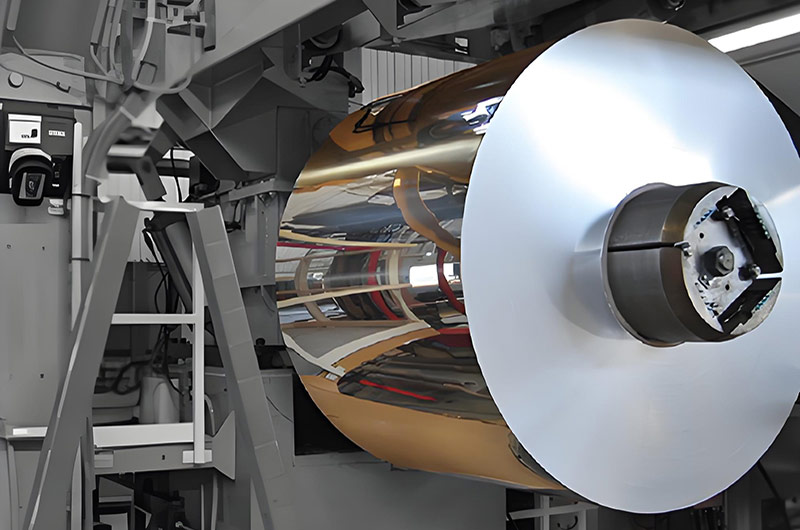
Polished Mirror Aluminum Sheet/coil Parameters
| MECHANICAL PROPERTIES | |||||||
| Type Ref. | Description of finishing | T.S (N/mm2) | Ys(N/mm2) | Elongation A50(%) | Minimum TotalReflectance( %) | Diffuse Reflectance( %) | MinimumBend Radil(T) |
| 1060 (H18) | Polished mirror | ≥160 | ≥85 | ≥1 | ≥87 | ≤12 | 1.0T |
| 1060(H16) | Polished mirror | 110-155 | ≥75 | ≥1 | ≥87 | ≤12 | 1.0T |
| 1060(H24) | Polished mirror | 95-135 | ≥70 | ≥2 | ≥87 | ≤12 | 0.5T |
Classification of Mirror Aluminum Sheet Coil
Mirror aluminum sheet coils can be classified based on surface treatment, such as embossed mirror aluminum sheet coil, anodized mirror aluminum sheet, color-coated mirror aluminum sheet, etc.
Embossed Aluminum Mirror Sheet/Coil
Embossed mirror aluminum sheet coil is aluminum sheet coil that has undergone embossing treatment, giving it a surface with patterns like orange peel, spherical, diamond, and pebble patterns. Embossing not only increases the surface area of the aluminum sheet but also effectively enhances its heat dissipation performance. Additionally, embossing can increase the strength of the aluminum mirror sheet.
- Orange Peel Embossed Aluminum Mirror Sheet: The surface presents a texture similar to orange peel, offering good scratch resistance and decorative effect.
- Spherical Pattern Embossed Aluminum Mirror Sheet: The surface shows spherical patterns that can effectively disperse light and enhance decoration.
- Diamond Pattern Embossed Aluminum Mirror Sheet: The surface features diamond-shaped patterns, adding visual layers and uniqueness.
- Pebble Embossed Aluminum Mirror Plate: The surface resembles pebbles, providing both aesthetics and anti-slip effect.
- 5-Bar Embossed Aluminum Mirror Plate: The surface has 5 regular lines, commonly used in building decoration and flooring materials.
Anodized Aluminum Mirror Sheet
Anodized mirror aluminum sheet is aluminum sheet that has undergone anodizing treatment, forming a hard oxide film on the surface of the aluminum sheet, increasing its corrosion resistance and wear resistance. The mirror effect of anodized aluminum sheet can last for a long time, making it suitable for decorative applications requiring high durability.
Color-Coated Aluminum Mirror Sheet
Color-coated mirror aluminum sheet is aluminum sheet coated with colored paint. The color coating not only provides a variety of color choices but also enhances the weather resistance and corrosion resistance of the aluminum sheet. It is commonly used in building facades, interior decoration, and other fields.
Mirror ACP Aluminum Sheet
Mirror aluminum composite panel (ACP) consists of multiple layers of material, with the top and bottom layers being color-coated mirror aluminum alloy sheets, and the core being non-toxic low-density polyethylene (PE). The front side is covered with a protective film. For outdoor applications, the front surface of the ACP can be coated with a fluorocarbon resin (PVDF) coating to ensure that the paint does not fade for 15 years. For indoor applications, the front surface can be coated with a PE coating.
High Reflective Mirror Aluminum
High reflective mirror aluminum sheet has extremely high light reflectivity and is commonly used in areas requiring high light reflection, such as lighting equipment and reflectors.
Mirror Aluminum Circle
Mirror aluminum circle is usually used to make various round aluminum products, such as decorative panels and signs, offering good reflective effects and visual aesthetics.
Aluminum Mirror Sheet Properties
- High Reflectivity: These sheets are designed to reflect a high proportion of light, suitable for lighting reflectors, solar applications, and decorative purposes.
- Corrosion Resistance: Aluminum has natural corrosion resistance, and mirror aluminum sheets can be further treated to enhance this property, making them suitable for various environments.
- Durability: These sheets, with protective coatings or anodized treatment, have good durability, able to resist weathering and scratching.
- Cost-Effectiveness: Mirror aluminum sheets are usually a more economical alternative compared to stainless steel or other reflective materials.
Application Scenarios of Mirror Aluminum Sheet Coil
Building Facades

As facade materials, mirror aluminum sheets can reflect the surrounding environment, creating a "disappearing wall" effect and significantly enhancing the landmark presence of urban buildings.
Lighting Reflector Panels

Standard mirror aluminum sheets used as LED lamp reflectors can improve light efficiency by more than 30%, significantly increasing lighting performance.
Electronic Product Casings

Super mirror aluminum sheets are used in phone/computer casings, combining aesthetics with electromagnetic shielding and excellent heat dissipation performance.
Automotive Interiors

Mirror aluminum sheets are used for car dashboards, door trims, and other interior parts, enhancing luxury with metallic luster while contributing to weight reduction and efficiency in new energy vehicles.
Ship Decoration

Corrosion-resistant alloy mirror aluminum sheets such as 5052 are used for ship interior decorations and exterior components, capable of resisting seawater corrosion while maintaining beauty and durability.
Artworks and Sculptures

Mirror aluminum sheets are used in art creation and sculptures, capable of producing unique light and shadow effects and visual experiences, making them an ideal material for modern art.
Common Aluminum Mirror Grades and Chemical Composition
| Alloy | Si | Fe | Cu | Mn | Mg | Cr | Zn | Ni | Ti | Other | Al | |
| Each | Total | |||||||||||
| 1050 | 0.25 | 0.4 | 0.05 | 0.05 | 0.05 | - | 0.05 | - | 0.05 | 0.03 | - | 99.5 |
| 1060 | 0.25 | 0.35 | 0.05 | 0.03 | 0.03 | - | 0.05 | - | 0.03 | 0.03 | - | 99.6 |
| 1070 | 0.20 | 0.25 | 0.04 | 0.03 | 0.03 | - | 0.07 | - | 0.03 | 0.03 | - | 99.7 |
Common Aluminum Mirror Grades and Mechanical Properties
| Alloy | Total Reflectivity | Diffuse Reflectivity | Performance Data | |
| Tensile Strength | Elongation % | |||
| 1050, 1060, 1070 | 80~86% | ≦12% | 85~160 | 4.0~7.5 |
How to Choose the Right Mirror Aluminum Sheet Coil
Choose According to Application Environment
Outdoor Environment
- Select alloys with good corrosion resistance and high strength
- Choose surface treatment such as fluorocarbon coating or anodizing
- Select imported products or high-quality domestic products with stable reflectivity
Indoor Environment
- Choose anodized mirror aluminum sheets with a wide range of color options
- Select different colors and effects according to design style
- In dry environments, pure aluminum mirror sheets can be used
Choose According to Performance Requirements
Reflectivity Requirements
- High reflectivity applications: Super mirror aluminum sheet (≥95%)
- General decoration: Standard mirror aluminum sheet (86%-90%)
- Ordinary applications: Regular mirror aluminum sheet (80%-86%)
Strength Requirements
- Structural applications: Choose 3003 or 5052 series
- Decorative applications: Pure aluminum mirror sheets
- High strength requirements: 5052 or 6061 and other high-strength alloys
Choose According to Budget and Cost
- Material cost: Pure aluminum < 3 Series alloy < 5 Series alloy < Imported products
- Processing cost: Pure aluminum has lower processing costs, alloys are slightly more difficult to process
- Surface treatment cost
Mirror Aluminum Sheet Coil Production
In the production process of mirror aluminum sheet coil, the aluminum coil surface undergoes fine polishing and treatment to ensure its reflective effect and smoothness. A protective film is usually applied to prevent surface damage during transportation and handling.
Aluminum Coil Preparation
- Aluminum alloy selection: First, choose aluminum alloy raw materials suitable for mirror processing, commonly used are series 1050, 1060, and 1100. The selection of aluminum alloy directly affects the final product's quality and performance.
- Aluminum coil rolling: The aluminum alloy raw material undergoes preliminary hot rolling and cold rolling to form the basic shape of the aluminum coil. The rolling at this stage determines the thickness and basic surface quality of the aluminum coil.
Fine Polishing Process
- Surface grinding: The aluminum coil surface is subjected to multi-stage grinding to remove rough textures and surface defects generated during preliminary rolling. High-precision sandpaper or grinding machines are typically used for grinding to ensure a smooth surface.
- Polishing: The ground aluminum coil surface is finely polished. The polishing process includes using abrasive paste and polishing machines to achieve a high-gloss finish, creating a mirror effect. This process requires precise control to ensure uniform and smooth reflective effects.
Surface Treatment
- Cleaning: The polished aluminum coil undergoes thorough cleaning to remove residual abrasives and contaminants, ensuring a flawless surface.
- Protective film application: To prevent surface damage during transportation and handling, a protective film is usually applied to the aluminum coil surface. This protective film effectively prevents scratches, dirt, and other external impacts while maintaining the mirror-like gloss of the aluminum coil.
Inspection and Packaging
- Quality inspection: After production, each roll of mirror aluminum coil undergoes strict quality inspection. The inspection includes surface smoothness, reflective effect, thickness uniformity, and other factors to ensure that the product meets the specifications.
- Packaging: The inspected aluminum coil is carefully packaged. Packaging materials usually include protective paper, plastic film, and wooden pallets to ensure safe transportation. Product information and precautions are also marked on the packaging to ensure correct handling and use.
Transportation and Delivery
- Transportation: During transportation, mirror aluminum coils need to avoid severe vibration and impact to prevent damage to the protective film or scratches on the aluminum coil surface. Transport vehicles are typically equipped with appropriate protective measures to ensure the safe arrival of the aluminum coil at its destination.
- Delivery: Upon arrival at the customer's location, the aluminum coil undergoes a final inspection to ensure no issues occurred during transportation. Qualified products are delivered according to the customer's requirements, ready for use.
Mirror aluminum sheet coil, with its excellent reflective properties, superior surface treatment, and wide range of applications, is an important choice for modern decorative and functional materials.
Frequently Asked Questions About Mirror Aluminum Sheet Coil
What should I do if there are scratches or dirt on the surface of the mirror aluminum coil?
Cause: The surface of the mirror aluminum coil is relatively sensitive and prone to scratches or dirt, especially during transportation and handling.
Solution: You can gently wipe the surface with a soft cleaning cloth and a neutral cleaner, avoiding the use of rough tools or chemicals to prevent further damage to the mirror effect. If the scratches are deep, professional repair services may be needed.
How should I properly store mirror aluminum coils to prevent surface damage?
Cause: Improper storage may cause scratches or discoloration on the aluminum coil surface.
Solution: Store the mirror aluminum coil in a dry, clean environment, avoiding direct contact with the ground or walls. Using protective films and packaging materials can effectively reduce external impacts. Additionally, the storage area should maintain a constant temperature to avoid extreme temperature changes.
Will the reflective effect of the mirror aluminum coil change over time?
Cause: The reflective effect of the mirror aluminum coil may be affected by oxidation, contamination, or wear.
Solution: Regular cleaning and maintenance of the aluminum coil surface can preserve its reflective effect. Using specialized aluminum protectants can slow down oxidation and wear.
What happens to the mirror aluminum coil in a high-temperature environment?
Cause: High temperatures may cause discoloration or deformation of the aluminum coil surface.
Solution: Avoid exposing mirror aluminum coils to high-temperature environments. For applications requiring high-temperature resistance, choose aluminum alloys or surface treatment materials with high-temperature resistance.

